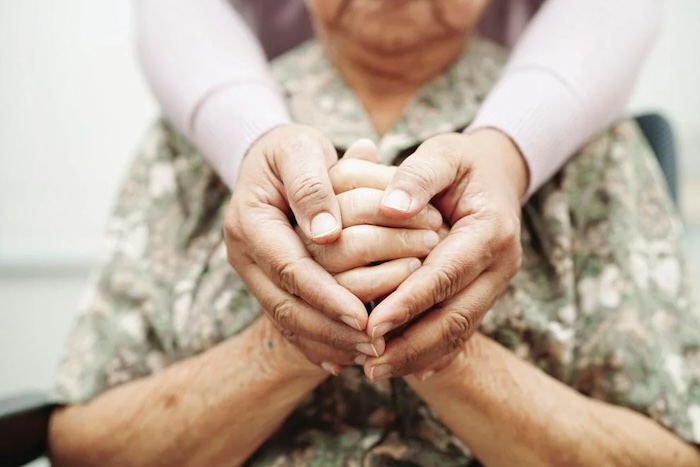— What I find with some regularity is that people who are dying really do want, need and desire to talk about it.

By Rabbi Joseph H. Krakoff
Hospice — or as it is sometimes referred to — the ‘H’ word — can be a very scary, anxiety-producing proposition. And while that certainly makes sense, it is also a compassionate place to go for care that offers comfort, peace and love. As the end of life draws near, hospice is poised to meet every individual where they are at physically, emotionally, psychologically and spiritually.
What I have discovered over the last decade of visiting patients who have chosen hospice care is that even when they were reticent at first, they are ultimately grateful to have the tremendous support of a team of nurses, aides, social workers, clergy and volunteers who are there for them around the clock.
I can’t help but think back to an experience I had several years ago on a patient visit. I went to see an 85-year-old man who had been diagnosed with end-stage cancer. His adult children had made a unanimous decision not to tell their father that he was dying. On my first visit, the three siblings greeted me in the foyer of the man’s home to firmly instruct me not to tell their dad that he was on hospice. Naturally, I accommodated their request. Then, on my third visit, without warning, the man asked his children to leave the room because he wanted to speak to me alone.
He asked me to sit down next to him on the chair by the bed and said the following: “Rabbi, my family thinks that I don’t know what is going on. But I do! I recognize that I am dying and know I am receiving hospice care. I have lived a very good life. I am grateful and know my time is short. I have come to terms with my demise. But what I struggle with the most is that I really want to talk with my children about the fact that I am dying, but they won’t hear of it. Please help me help them. I need to get my affairs in order. Even more, I want the chance to say goodbye to each family member and express my gratitude and love for them. Rabbi, please help me. I am desperate.”
This is not an uncommon occurrence. What I find with some regularity is that people who are dying really do want, need and desire to talk about it. And so often, it is the hospice experience that plays an essential role in bringing families together to have these all-important conversations.
The word hospice itself originated in medieval times, a derivative of the Latin “hospes” meaning host or guest. Hospice as a concept appears initially in the mid-1800s to describe caring for dying patients and is based on the model created by Mrs. Jeanne Garnier, the founder of the Dames de Calaire in Lyon, France. The Irish Sisters of Charity adopted it when they created Our Lady’s Hospice in Dublin, Ireland, in 1879 and then again when they opened St. Joseph’s Hospice in Hackney, London, England, in 1905. It wasn’t until 1974 though that the first hospice was established in the United States.
Today, hospice is available through Medicare to critically/terminally ill patients who are declining and expected to die within six months, although they often live longer. The individual agrees to forgo any kind of aggressive medical intervention including curative treatment. The vast majority of hospice is covered by Medicare, though some is paid for by private insurance, Medicaid and the Department of Veterans Affairs. Hospice agencies develop a specific care plan for each patient to treat the symptoms of the person’s illness and are on call 24 hours a day, seven days a week.
One of the biggest misnomers about hospice care is that accepting a referral to hospice means that the individual is “throwing in the towel” and giving up on life. For this reason, it is not unusual that people may be discouraged by family members. But when the medical team determines that there is nothing else clinically that can be done and the terminally ill person is psychologically ready, hospice can be the best and most humane choice for reducing physical pain, maximizing emotional well-being and enhancing spiritual peace. It is not unusual to see someone on hospice actually begin to feel better due to the layer of care provided by the hospice team.
In choosing hospice, the individual has made the decision, in the event of a crisis, not to go to the hospital or to call 911. Rather, all phone calls for help are made directly to the hospice organization. And if, for whatever reason, a person changes their mind, they always maintain the authority to revoke their hospice benefit and revert to calling 911, going to the hospital or resuming treatment.
While we can be certain that there will always be a modicum of discomfort about uttering the ‘h’ word, the truth is that hospice care wholly focused on comfort and peace is a true gift. At JHCN, we take pride in meeting each person where they are and thoughtfully addressing their whole range of needs in an honest, caring and loving way. Most of all, we provide the unique opportunity — through our social workers, clergy, volunteers and Life Enrichment specialists — that when the body can no longer be healed, we focus on the holy responsibility to assist in healing the spirit and the soul.
Complete Article ↪HERE↩!
